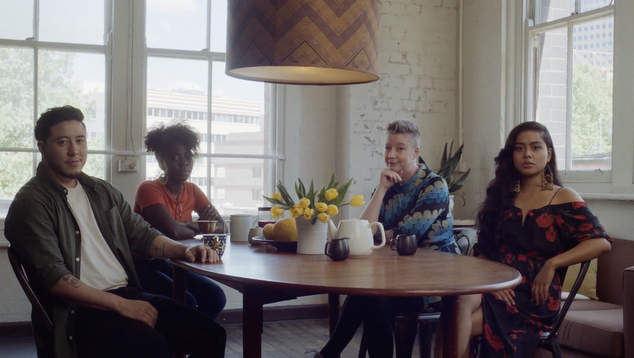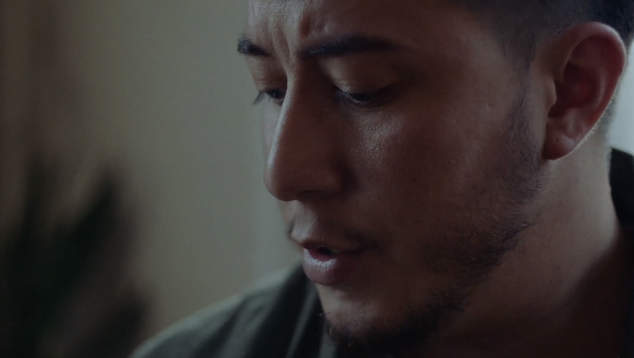
To celebrate Harmony Week, T2 have brought together some of Australia’s best slam poets to talk about judgements, microaggressions, and discrimination.
Being confronted in bathrooms for being transgender, judgements for accents that are not native English, and requests to ‘touch Afro hair’ are just some of the shaming experiences endured by the featured artists.

Jesse Oliver is a transgender poet who has appeared on national platforms including the National Young Writers Festival, the Emerging Writers Festival, the Digital Writers Festival and the Australian Poetry Slam National Final.
From the struggles of being transgender and dealing with serious challenges including homelessness, to confrontations from strangers on using a public toilet—Jesse is sharing his story to help break down barriers to understanding and acceptance.
The campaign highlights that hurtful ignorance doesn’t stop at sexual identity, as many Australians feel marginalised by their gender, age or ethnic background. Almost half (49 percent) of multicultural young people admit to experiencing some form of discrimination or unfair treatment, a stark contrast from our reputation as a nation of tolerance. Hurtful ignorance doesn’t stop at race, as many Australians feel marginalised by their gender, age or sexual identity.
Jesse Oliver is joined in the clip by Anisa Nandaula, Eunice Andrada, and Emilie Collyer who share their experiences of discrimination showing that whether it be about race, age, gender or sexuality, the effects are the same.
Jesse Oliver caught up with Graeme Watson to discus making the campaign with T2. The Western Australian poet just moved to Melbourne at the start of the year, and shares he’s finding a fresh breath of creativity in his new home.
It’s been five year since we first met at a poetry night at the Sparrow’s Nest cafe, what’s your journey as a poet been over that time?
It’s been amazing, it’s basically become the main focus of my life and I’d go so far as to say it’s a vocational calling. It really is what I’m meant to be doing. I really enjoy it, I don’t see it as work. There’s been an emotional journey that has accompanied it as well, because obviously i was quite shy when i was starting off and it’s done incredible things for my ability to be confident in who i am and present that to the world. That’s how the journey has landed me here, and it just keeps getting better and better.
Has the way you create and write work changed?
It has, I noticed when I first started writing it was a lot about who I was and my identity, and trying to figure out where my feelings stand in the world. Once I figured that out, I noticed my writing changed to look a little more outward and start tackling bigger issues that”m passionate about.
I’m mostly interested in social justice, I know the struggles I went through. I like writing about how to love and how to be understanding and accepting of everyone. I also write about the climate, I write about being trans, I write about all sorts of things.
For many creative people reaching that point where you feel confident to name your passion as your vocation can be a real hurdle, did you encounter that barrier to name yourself as a poet?
It’s a slow progression. Then you wake up one day and realise “This is all I want to do.” I remember the last shift I worked at Coles stacking shelves and thinking, “This is not where I where I want to b, there has to be more, and poetry was just that.” Sometimes it’s the opposite though, sometimes you don’t feel like an artist, but ‘fake it till you make it’.
What was it like working on the project for Harmony Week with T2.
It’s a collaboration between T2, myself and some of my absolute best friend poets. We all sort of had very similar themes in our writing and it came together very easily. T2 contacted us all and wanted to explore the theme of micro-aggression, and micro-ignorance. It was something that we all touched on in our poetry so it worked really well.
Watching the clip, it all fits together very smoothly, was it unusual seeing your words alongside other peoples?
It does fit together well. I think we had the benefit of mostly knowing each other and being familiar with each others styles. It is an unusual project to be meshing our styles together, but I think the saving grace is all we knew what the shared message was.
How would you define micro-aggression to someone who was unfamiliar with the term?
You could describe it as the unknowing ways that our ignorance might affect the way we approach or ask people questions, or the way that we think of other people. It starts with a micro-ignorance, where you may not have a full appreciation where you might not have a full understanding of that person’s story, or where they’ve come from. micro-ignorance turns into micro-aggression. Its when what you are saying is not as nice as you think it is.
Follow Jesse Oliver’s work on Facebook.
Graeme Watson






